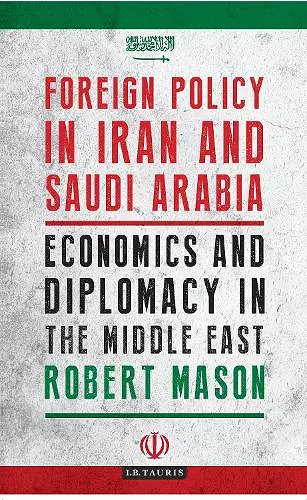Foreign Policy in Iran and Saudi Arabia
Economics and Diplomacy in the Middle East
Format:Hardback
Publisher:Bloomsbury Publishing PLC
Published:22nd Dec '14
Currently unavailable, and unfortunately no date known when it will be back

*Saudi Arabia and Iran are 2 key states in the Middle East in terms of security considerations. *Examines the effects of sanctions in response to Iran's nuclear programme: both topical and important
Saudi Arabia, with its US alliance and abundance of oil dollars, has a very different economic story to that of Iran, which despite enormous natural gas reserves, has been hit hard by economic, trade, scientiy c and military sanctions since its 1979 revolution. Robert Mason looks at the effect that economic considerations (such as oil, gas, sanctions, trade and investment) have on foreign policy decision-making processes and diplomatic activities. By examining the foreign policies of Saudi Arabia and Iran towards each other, and towards the wider Middle East and beyond, Mason seeks to highlight how oil policy, including oil production, pricing and security of supply and demand, is the paramount economic factor which drives the diplomacy and rivalry of these two pivotal regional powers. By comparing the foreign policy of Saudi Arabia and Iran towards the international community and the US in particular, Mason presents the very different economic and political trajectories of these two countries. In the case of Saudi Arabia, it has long been oil which has given the country importance both within the region and on an international scale.
This has made it a vital ally for the West, which culminated in the stationing of US troops on Saudi soil in the run up to the Gulf War of 1991. In contrast, Iran's 'resistance' strategy has, rather than concentrating on relationships with the West, instead looked to a number of other players, such as those in Central Asia and Latin America. Mason uses the Saudi and Iranian cases to illustrate the combination of ideological, geo-strategy and economic resources that have insulated these two regimes against internal and external pressures and resulted in their dominance in the regional system. By concentrating on the economic factors in alliance building and alliance deconstruction, Mason offers vital analysis for researchers of international relations in the Middle East and the processes involved in the formation of foreign policy.
'Robert Mason has written a conceptually engaging study which presents a welcome addition to foreign policy analysis in general and the foreign policies of Iran and Saudi Arabia in particular. Highly recommended for students of international relations and the politics of the Middle East.' Arshin Adib-Moghaddam, Professor in Global Thought and Comparative Philosophies, SOAS, University of London 'At a critical time in the Middle East, Robert Mason's analysis of the context for Iran and Saudi foreign policy - and the relations between the two states - is a valuable guide for both the possibilities and obstacles to diplomatic progress.' Scott Lucas, Professor of American Studies, University of Birmingham 'Robert Mason has produced a most detailed and analytically astute study of foreign policy in two critically important regional actors. In looking at Iran and Saudi Arabia comparatively, he has not only brought to the fore the complexities of (foreign) policy making in two prominent and competing Muslim states, but has also underlined the need to understand the drivers of foreign policy in these countries. Iran's and Saudi Arabia's policy choices may stem from the balancing of economic, ideological and geopolitical factors, but as Mason shows once these countries implement their chosen policies we are all then affected by them. To appreciate the importance of this comment you really must read this book!' Anoush Ehteshami, Professor of International Relations, Durham University' At a time when the Middle East is undergoing an intense political transformation following the onset of the Arab Spring and Iran and Saudi Arabia are able to overwhelm the role of foreign actors on regional issues, this book provides incisive research into understanding the ground components of the two states' foreign policy behaviour based on the burdens of history, preserving state security, oil politics, domestic power dynamics, and the role of foreign powers.' Kayhan Barzegar, Director of the Institute for Middle East Strategic Studies, Tehran
ISBN: 9781780767215
Dimensions: unknown
Weight: 481g
288 pages